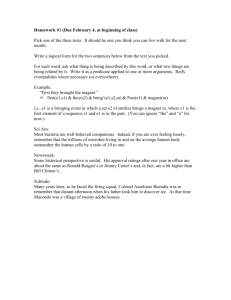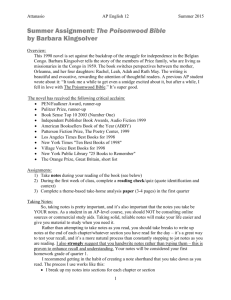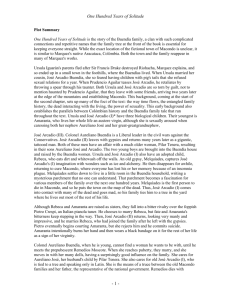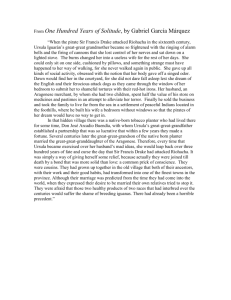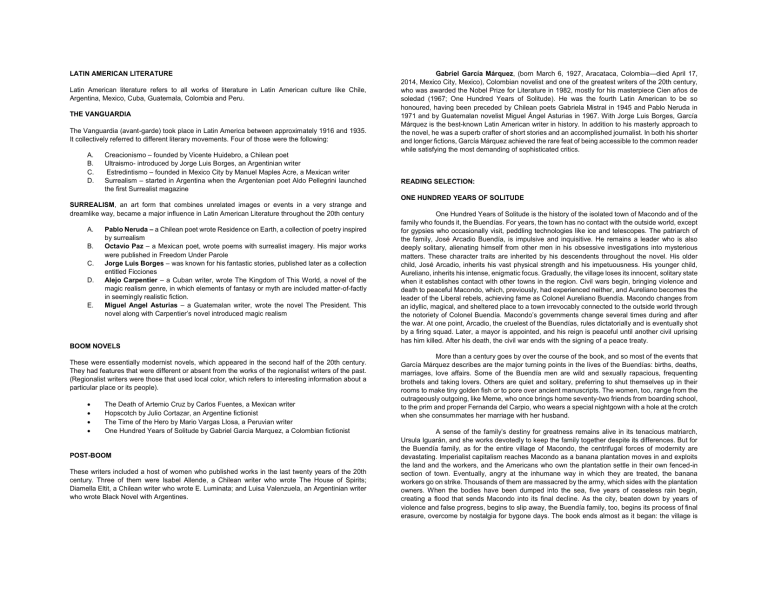
LATIN AMERICAN LITERATURE Latin American literature refers to all works of literature in Latin American culture like Chile, Argentina, Mexico, Cuba, Guatemala, Colombia and Peru. THE VANGUARDIA The Vanguardia (avant-garde) took place in Latin America between approximately 1916 and 1935. It collectively referred to different literary movements. Four of those were the following: A. B. C. D. Creacionismo – founded by Vicente Huidebro, a Chilean poet Ultraismo- introduced by Jorge Luis Borges, an Argentinian writer Estredintismo – founded in Mexico City by Manuel Maples Acre, a Mexican writer Surrealism – started in Argentina when the Argentenian poet Aldo Pellegrini launched the first Surrealist magazine Gabriel García Márquez, (born March 6, 1927, Aracataca, Colombia—died April 17, 2014, Mexico City, Mexico), Colombian novelist and one of the greatest writers of the 20th century, who was awarded the Nobel Prize for Literature in 1982, mostly for his masterpiece Cien años de soledad (1967; One Hundred Years of Solitude). He was the fourth Latin American to be so honoured, having been preceded by Chilean poets Gabriela Mistral in 1945 and Pablo Neruda in 1971 and by Guatemalan novelist Miguel Ángel Asturias in 1967. With Jorge Luis Borges, García Márquez is the best-known Latin American writer in history. In addition to his masterly approach to the novel, he was a superb crafter of short stories and an accomplished journalist. In both his shorter and longer fictions, García Márquez achieved the rare feat of being accessible to the common reader while satisfying the most demanding of sophisticated critics. READING SELECTION: ONE HUNDRED YEARS OF SOLITUDE SURREALISM, an art form that combines unrelated images or events in a very strange and dreamlike way, became a major influence in Latin American Literature throughout the 20th century A. B. C. D. E. Pablo Neruda – a Chilean poet wrote Residence on Earth, a collection of poetry inspired by surrealism Octavio Paz – a Mexican poet, wrote poems with surrealist imagery. His major works were published in Freedom Under Parole Jorge Luis Borges – was known for his fantastic stories, published later as a collection entitled Ficciones Alejo Carpentier – a Cuban writer, wrote The Kingdom of This World, a novel of the magic realism genre, in which elements of fantasy or myth are included matter-of-factly in seemingly realistic fiction. Miguel Angel Asturias – a Guatemalan writer, wrote the novel The President. This novel along with Carpentier’s novel introduced magic realism BOOM NOVELS These were essentially modernist novels, which appeared in the second half of the 20th century. They had features that were different or absent from the works of the regionalist writers of the past. (Regionalist writers were those that used local color, which refers to interesting information about a particular place or its people). The Death of Artemio Cruz by Carlos Fuentes, a Mexican writer Hopscotch by Julio Cortazar, an Argentine fictionist The Time of the Hero by Mario Vargas Llosa, a Peruvian writer One Hundred Years of Solitude by Gabriel Garcia Marquez, a Colombian fictionist POST-BOOM These writers included a host of women who published works in the last twenty years of the 20th century. Three of them were Isabel Allende, a Chilean writer who wrote The House of Spirits; Diamella Eltit, a Chilean writer who wrote E. Luminata; and Luisa Valenzuela, an Argentinian writer who wrote Black Novel with Argentines. One Hundred Years of Solitude is the history of the isolated town of Macondo and of the family who founds it, the Buendías. For years, the town has no contact with the outside world, except for gypsies who occasionally visit, peddling technologies like ice and telescopes. The patriarch of the family, José Arcadio Buendía, is impulsive and inquisitive. He remains a leader who is also deeply solitary, alienating himself from other men in his obsessive investigations into mysterious matters. These character traits are inherited by his descendents throughout the novel. His older child, José Arcadio, inherits his vast physical strength and his impetuousness. His younger child, Aureliano, inherits his intense, enigmatic focus. Gradually, the village loses its innocent, solitary state when it establishes contact with other towns in the region. Civil wars begin, bringing violence and death to peaceful Macondo, which, previously, had experienced neither, and Aureliano becomes the leader of the Liberal rebels, achieving fame as Colonel Aureliano Buendía. Macondo changes from an idyllic, magical, and sheltered place to a town irrevocably connected to the outside world through the notoriety of Colonel Buendía. Macondo’s governments change several times during and after the war. At one point, Arcadio, the cruelest of the Buendías, rules dictatorially and is eventually shot by a firing squad. Later, a mayor is appointed, and his reign is peaceful until another civil uprising has him killed. After his death, the civil war ends with the signing of a peace treaty. More than a century goes by over the course of the book, and so most of the events that García Márquez describes are the major turning points in the lives of the Buendías: births, deaths, marriages, love affairs. Some of the Buendía men are wild and sexually rapacious, frequenting brothels and taking lovers. Others are quiet and solitary, preferring to shut themselves up in their rooms to make tiny golden fish or to pore over ancient manuscripts. The women, too, range from the outrageously outgoing, like Meme, who once brings home seventy-two friends from boarding school, to the prim and proper Fernanda del Carpio, who wears a special nightgown with a hole at the crotch when she consummates her marriage with her husband. A sense of the family’s destiny for greatness remains alive in its tenacious matriarch, Ursula Iguarán, and she works devotedly to keep the family together despite its differences. But for the Buendía family, as for the entire village of Macondo, the centrifugal forces of modernity are devastating. Imperialist capitalism reaches Macondo as a banana plantation moves in and exploits the land and the workers, and the Americans who own the plantation settle in their own fenced-in section of town. Eventually, angry at the inhumane way in which they are treated, the banana workers go on strike. Thousands of them are massacred by the army, which sides with the plantation owners. When the bodies have been dumped into the sea, five years of ceaseless rain begin, creating a flood that sends Macondo into its final decline. As the city, beaten down by years of violence and false progress, begins to slip away, the Buendía family, too, begins its process of final erasure, overcome by nostalgia for bygone days. The book ends almost as it began: the village is once again solitary, isolated. The few remaining Buendía family members turn in upon themselves incestuously, alienated from the outside world and doomed to a solitary ending. In the last scene of the book, the last surviving Buendía translates a set of ancient prophecies and finds that all has been predicted: that the village and its inhabitants have merely been living out a preordained cycle, incorporating great beauty and great, tragic sadness. Remedios Moscote The child-bride of Colonel Aureliano Buendía, Remedios Moscote brings joy to the Buendía household for a short while before she dies suddenly, possibly of a miscarriage. José Arcadio The Buendía Family – First Generation The first son of Úrsula Iguarán and José Arcadio Buendía, from whom he inherits his amazing strength and his impulsive drive. After running off in pursuit of a gypsy girl, José Arcadio returns a savage brute of a man and marries Rebeca, the orphan adopted by the Buendías. He is the father, with Pilar Ternera, of Arcadio, and brother to Colonel Aureliano Buendía and Amaranta. José Arcadio Buendía Rebeca The patriarch of the Buendía clan, José Arcadio Buendía is Macondo’s founder and its most charismatic citizen. He is a man of great strength and curiosity. Impulsively, he embarks on mad pursuits of esoteric and practical knowledge, and it is his solitary and obsessive quest for knowledge that drives him mad at the end of his life; he spends many years, in the end, tied to a tree in the Buendía backyard, speaking Latin that only the priest understands. José Arcadio Buendía is married to Úrsula Iguarán and the father of José Arcadio, Colonel Aureliano Buendía, and Amaranta. The earth-eating orphan girl who mysteriously arrives at the Buendía doorstep. Rebeca is adopted by the Buendí family. Rebeca infects the town with an insomnia that causes loss of memory. Rebeca seems to orphan herself from society and the Buendía family when, after her husband José Arcadio’s death, she becomes a hermit, never seen outside her dilapidated home. Úrsula Iguarán Third Generation The tenacious matriarch of the Buendía clan, Úrsula lives to be well over a hundred years old, continuing with her hard-headed common sense to try and preserve the family. Every now and then, when things get particularly run-down, Úrsula revitalizes the family both physically and emotionally, repairing the Buendía house and breathing new life into the family. She is the wife of José Arcadio Buendía and the mother of José Arcadio, Colonel Aureliano Buendía, and Amaranta. Aureliano José CHARACTERS The son of Colonel Aureliano Buendía and Pilar Ternera. Aureliano José becomes obsessed with his aunt, Amaranta, and joins his father’s army when she ends the affair. He deserts the army to return to her, however, but she rejects him, horrified. He is killed by Conservative soldiers. Arcadio Second Generation Amaranta The daughter of Úrsula Iguarán and José Arcadio Buendía, Amaranta dies an embittered and lonely virgin. She bears deep jealousy and hatred for Rebeca, whom, she believes, stole Pietro Crespi from her. In many ways her life is characterized by a fear of men; when Pietro Crespi finally falls in love with her, she rejects him, and he kills himself. As penance, she gives herself a bad burn on the hand and wears a black bandage over it for the rest of her life. When she is much older, she finds real love with Colonel Gerineldo Márquez, but she spurns him because of her ancient fear and bitterness. She is also the object of the unconsummated incestuous passion of Aureliano José, whom she helped to raise. Amaranta is the sister of Colonel Aureliano Buendía and José Arcadio. The son of José Arcadio and Pilar Ternera. Arcadio, seemingly a gentle boy, becomes schoolmaster of the town. When Colonel Aureliano Buendía places him in charge of Macondo during the uprising, however, Arcadio proves a vicious dictator who is obsessed with order. He is killed when the conservatives retake the village. Arcadio marries Santa Sofía de la Piedad and is the father of Remedios the Beauty, Aureliano Segundo, and José Arcadio Segundo. Santa Sofía de la Piedad The quiet woman, almost invisible in this novel, who marries Arcadio and continues to live in the Buendía house for many years after his death, impassively tending to the family. She is the mother of Remedios the Beauty, Aureliano Segundo, and José Arcadio Segundo. She does not quite seem to exist in the real world, and when she grows old and tired, she simply walks out of the house, never to be heard from again. Colonel Aureliano Buendía The second son of José Arcadio Buendía and Úrsula Iguarán. Aureliano grows up solitary and enigmatic, with a strange capacity for extrasensory perception. Outraged by the corruption of the Conservative government, he joins the Liberal rebellion and becomes Colonel Aureliano Buendía, the rebel commander. After years of fighting, he loses his capacity for memory and deep emotion, signs a peace accord, and withdraws into his workshop, a lonely and hardened man. He is the widower of Remedios Moscote and the father, with Pilar Ternera, of Aureliano José, and of seventeen sons—each named Aureliano—by seventeen different women. Fourth Generation Remedios the Beauty The daughter of Santa Sofía de la Piedad and Arcadio, Remedios the Beauty becomes the most beautiful woman in the world: desire for her drives men to their deaths. Not comprehending her power over men, she remains innocent and childlike. One day, she floats to heaven, leaving Macondo and the novel abruptly. José Arcadio Segundo Meme The son of Arcadio and Santa Sofía de la Piedad, José Arcadio Segundo may have been switched at birth with his twin brother, Aureliano Segundo. Appalled by witnessing an execution at an early age, José Arcadio Segundo becomes thin, bony, solitary, and increasingly scholarly, like his greatuncle Colonel Aureliano Buendía. A cockfighter and a drifter, he finds purpose in leading the strikers against the banana company. He is the lone survivor of the massacre of the strikers, and when he finds that nobody believes the massacre occurred, he secludes himself in Melquíades’ old study, trying to decipher the old prophecies and preserving the memory of the massacre. The daughter of Fernanda del Carpio and Aureliano Segundo, Meme’s real name is Renata Remedios. She feigns studiousness and docility to please her mother, but she is actually a hedonist like her father. When her mother discovers her illicit affair with Mauricio Babilonia, she posts a guard in front of the house; the guard ends up shooting Mauricio. He ends up paralyzed, and Meme is imprisoned in a convent where she spends the rest of her life. The product of her affair with Babilonia is Aureliano (II). Aureliano Segundo Sixth Generation The son of Arcadio and Santa Sofía de la Piedad, Aureliano Segundo may have been switched at birth with his twin brother, José Arcadio Segundo. Despite an early interest in solitary study— characteristic of his great-uncle, Colonel Aureliano Buendía—Aureliano Segundo begins to show all the characteristics of the family’s José Arcadios: he is immense, boisterous, impulsive, and hedonistic. Although he loves the concubine Petra Cotes, he is married to the cold beauty Fernanda del Carpio, with whom he has three children: Meme, José Arcadio (II) and Amaranta Úrsula. Aureliano (II) Fernanda del Carpio The illegitimate son of Meme and Mauricio Babilonia, Aureliano (II) is concealed by his scandalized grandmother, Fernanda del Carpio. He grows up a hermit in the Buendía household, only gradually acclimating himself to society. Aureliano (II) becomes a scholar, and it is he who eventually deciphers the prophecies of Melquíades. With his aunt, Amaranta Úrsula, he fathers the last in the Buendía line, the baby Aureliano (III), who dies soon after birth. The wife of Aureliano Segundo and the mother of Meme, José Arcadio (II), and Amaranta Úrsula. Fernanda del Carpio was raised by a family of impoverished aristocrats; she is very haughty and very religious. Her hedonistic husband does not love her and maintains his relationship with his concubine, Petra Cotes. Fernanda del Carpio, meanwhile, tries unsuccessfully to impress her sterile religion and aristocratic manners on the Buendía house. Characters who are not members of the Buendía Family Melquíades Fifth Generation José Arcadio (II) The eldest child of Aureliano Segundo and Fernanda del Carpio, Úrsula decides that José Arcadio (II) is supposed to become the Pope, but he in fact slides into dissolution and solitude. On his return from his unsuccessful trip to seminary in Italy, José Arcadio (II) leads a life of debauchery with local adolescents who eventually murder him and steal his money. The gypsy who brings technological marvels to Macondo and befriends the Buendía clan. Melquíades is the first person to die in Macondo. Melquíades serves as José Arcadio Buendía’s guide in his quest for knowledge and, even after dying, returns to guide other generations of Buendías. Melquíades’ mysterious and undecipherable prophecies, which torment generations of Buendías, are finally translated by Aureliano (II) at the end of the novel—they contain the entire history of Macondo, foretold. Amaranta Úrsula Pilar Ternera The daughter of Aureliano Segundo and Fernanda del Carpio, Amaranta Úrsula returns from her trip to Europe with a Belgian husband, Gaston. She wants to revitalize Macondo and the Buendía household, but it is too late: both are headed for inevitable ruin. She falls in love with her nephew, Aureliano (II), and gives birth to his child, whom they also name Aureliano (III) and who proves the last in the Buendía line. Born of incest, he has the tail of a pig. Amaranta dies in childbirth. A local whore and madam. With José Arcadio, Pilar is the mother of Arcadio; with Colonel Aureliano Buendía, she is the mother of Aureliano José. She is also a fortune-teller whose quiet wisdom helps guide the Buendía family. She survives until the very last days of Macondo. Gaston Aureliano Segundo’s concubine. Petra Cotes and Aureliano Segundo become extremely rich—their own love seems to inspire their animals to procreate unnaturally quickly. Even after the poverty caused by the flood, she stays with Aureliano Segundo; their deepened love is one of the purest emotions in the novel. The Belgian husband of Amaranta Úrsula, Gaston is loving and cultured but feels isolated in the now-desolate Macondo. He travels to Belgium to start an airmail company, and, when he hears of the relationship between his wife and Aureliano (II), he never returns. Petra Cotes Mauricio Babilonia The sallow, solemn lover of Meme. Fernanda del Carpio disapproves of their affair, and she sets up a guard who shoots Mauricio Babilonia when he attempts to climb into the house for a tryst with Meme. As a result, Mauricio lives the rest of his life completely paralyzed. He fathers Meme’s child, Aureliano (II). Protagonist The Buendía family; in a single character, Úrsula Iguarán, the soul and backbone of the family. Pietro Crespi Major Conflict The gentle, delicate Italian musician who is loved by both Amaranta and Rebeca. Rebeca, however, chooses to marry the more manly José Arcadio. After Amaranta leads on Pietro and rejects him, Pietro commits suicide. The struggle between old and new ways of life; tradition and modernity Rising Action Colonel Gerineldo Márquez Macondo’s civil war; Macondo acquires a banana plantation. The comrade-in-arms of Colonel Aureliano Buendía. Colonel Gerineldo is the first to become tired of the civil war. He falls in love with Amaranta, who spurns him. Climax Don Apolinar Moscote The banana workers go on strike and are massacred near the train station. Father of Remedios Moscote and government-appointed magistrate of Macondo. Don Apolinar Moscote is a Conservative and helps rig the election so that his party will win. His dishonesty is partly why Colonel Aureliano Buendía first joins the Liberals. Falling Action Indepth Facts: Themes Narrator The subjectivity of experienced reality; the inseparability of past, present, and future; the power of reading and of language The banana plantation shuts down; Macondo returns to its former isolation and backwardness; the Buendía clan dies out; Aureliano (II), who finally discovers how to read Melquíades’s prophecies, realizes that the rise and fall of the Buendías has always been destined to happen Omniscient and anonymous, but primarily concerned with what the Buendías are doing and how they are feeling. Motifs Point Of View Memory and forgetfulness; the Bible; the gypsies Third person, but sometimes uses vivid descriptions to show the reader the world through the eyes of one of the characters. Symbols Little gold fishes; the railroad; the English encyclopedia; the golden chamber pot Tone Foreshadowing Although García Márquez writes with wonder and is truly sympathetic to the deep emotions of his characters, he also maintains a certain detachment, so that we are always aware that the book is an account of Macondo as it appears to a modern, cultured eye. Tense Past, with occasional flashbacks. There are also brief, single-sentence references to future events that unfold with the novel. Setting (Time) The early 1800s until the mid 1900s. Setting (Place) Macondo, a fictional village in Colombia. The fact that both Colonel Aureliano Buendía and Arcadio will face firing squads is heavily foreshadowed in several places. The final, apocalyptic reading of the prophecies is also foreshadowed throughout the novel: García Márquez often mentions the prophecies in passing, and we see various members of the family puzzled by them at different times.
